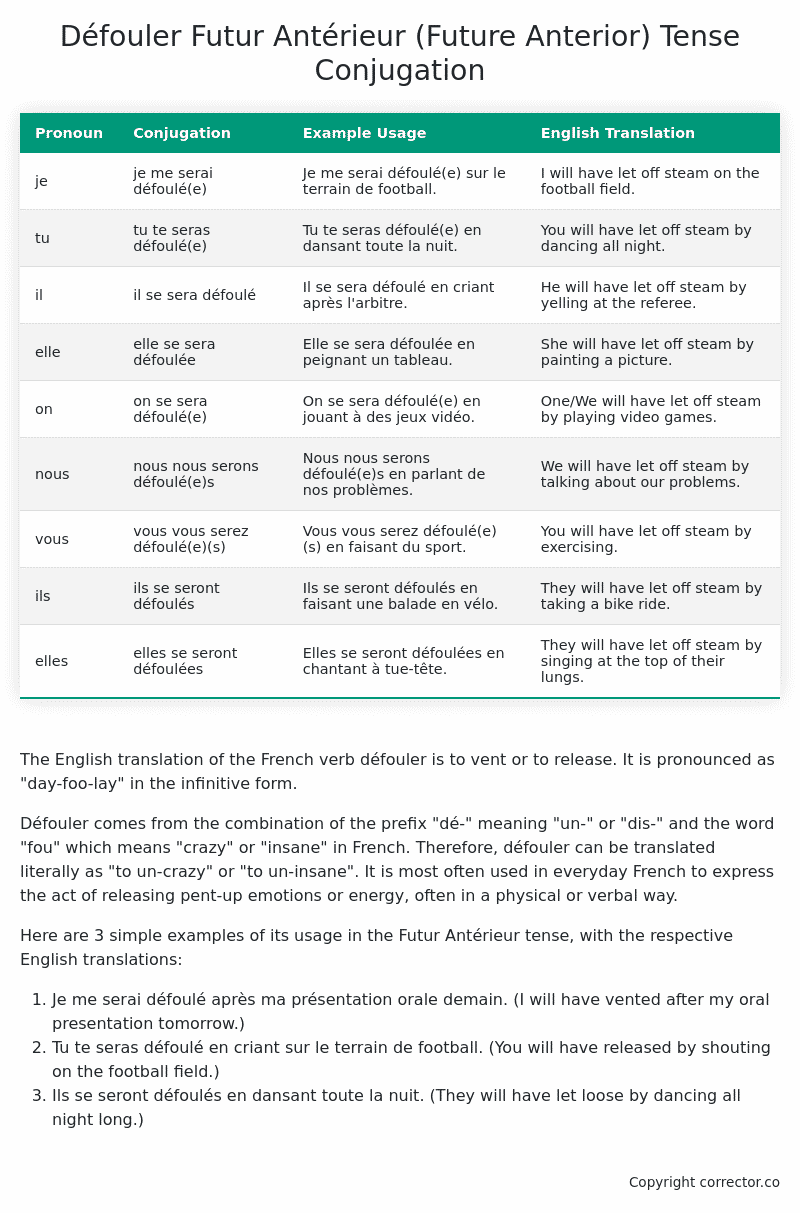Futur Antérieur (Future Anterior) Tense Conjugation of the French Verb défouler
Introduction to the verb défouler
The English translation of the French verb défouler is to vent or to release. It is pronounced as “day-foo-lay” in the infinitive form.
Défouler comes from the combination of the prefix “dé-” meaning “un-” or “dis-” and the word “fou” which means “crazy” or “insane” in French. Therefore, défouler can be translated literally as “to un-crazy” or “to un-insane”. It is most often used in everyday French to express the act of releasing pent-up emotions or energy, often in a physical or verbal way.
Here are 3 simple examples of its usage in the Futur Antérieur tense, with the respective English translations:
- Je me serai défoulé après ma présentation orale demain. (I will have vented after my oral presentation tomorrow.)
- Tu te seras défoulé en criant sur le terrain de football. (You will have released by shouting on the football field.)
- Ils se seront défoulés en dansant toute la nuit. (They will have let loose by dancing all night long.)
Table of the Futur Antérieur (Future Anterior) Tense Conjugation of défouler
| Pronoun | Conjugation | Example Usage | English Translation |
|---|---|---|---|
| je | je me serai défoulé(e) | Je me serai défoulé(e) sur le terrain de football. | I will have let off steam on the football field. |
| tu | tu te seras défoulé(e) | Tu te seras défoulé(e) en dansant toute la nuit. | You will have let off steam by dancing all night. |
| il | il se sera défoulé | Il se sera défoulé en criant après l’arbitre. | He will have let off steam by yelling at the referee. |
| elle | elle se sera défoulée | Elle se sera défoulée en peignant un tableau. | She will have let off steam by painting a picture. |
| on | on se sera défoulé(e) | On se sera défoulé(e) en jouant à des jeux vidéo. | One/We will have let off steam by playing video games. |
| nous | nous nous serons défoulé(e)s | Nous nous serons défoulé(e)s en parlant de nos problèmes. | We will have let off steam by talking about our problems. |
| vous | vous vous serez défoulé(e)(s) | Vous vous serez défoulé(e)(s) en faisant du sport. | You will have let off steam by exercising. |
| ils | ils se seront défoulés | Ils se seront défoulés en faisant une balade en vélo. | They will have let off steam by taking a bike ride. |
| elles | elles se seront défoulées | Elles se seront défoulées en chantant à tue-tête. | They will have let off steam by singing at the top of their lungs. |
Other Conjugations for Défouler.
Le Present (Present Tense) Conjugation of the French Verb défouler
Imparfait (Imperfect) Tense Conjugation of the French Verb défouler
Passé Simple (Simple Past) Tense Conjugation of the French Verb défouler
Passé Composé (Present Perfect) Tense Conjugation of the French Verb défouler
Futur Simple (Simple Future) Tense Conjugation of the French Verb défouler
Futur Proche (Near Future) Tense Conjugation of the French Verb défouler
Plus-que-parfait (Pluperfect) Tense Conjugation of the French Verb défouler
Passé Antérieur (Past Anterior) Tense Conjugation of the French Verb défouler
Futur Antérieur (Future Anterior) Tense Conjugation of the French Verb défouler (this article)
Subjonctif Présent (Subjunctive Present) Tense Conjugation of the French Verb défouler
Subjonctif Passé (Subjunctive Past) Tense Conjugation of the French Verb défouler
Subjonctif Imparfait (Subjunctive Imperfect) Tense Conjugation of the French Verb défouler
Subjonctif Plus-que-parfait (Subjunctive Pluperfect) Tense Conjugation of the French Verb défouler
Conditionnel Présent (Conditional Present) Tense Conjugation of the French Verb défouler
Conditionnel Passé (Conditional Past) Tense Conjugation of the French Verb défouler
L’impératif Présent (Imperative Present) Tense Conjugation of the French Verb défouler
L’infinitif Présent (Infinitive Present) Tense Conjugation of the French Verb défouler
Struggling with French verbs or the language in general? Why not use our free French Grammar Checker – no registration required!
Get a FREE Download Study Sheet of this Conjugation 🔥
Simply right click the image below, click “save image” and get your free reference for the défouler Futur Antérieur tense conjugation!

Défouler – About the French Futur Antérieur (Future Anterior) Tense
Construction
Common Everyday Usage Patterns
Interactions with Other Tenses
For example
Summary
I hope you enjoyed this article on the verb défouler. Still in a learning mood? Check out another TOTALLY random French verb conjugation!


